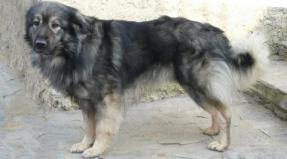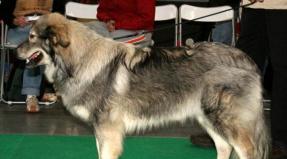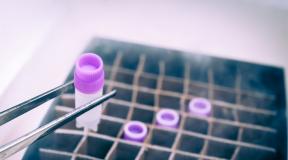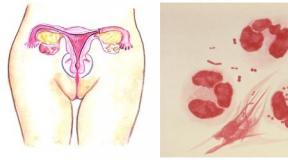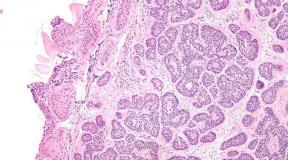1 City Hospital Fluorography. E Cardiology department
Head Department K.M.N. Kotov S.V. If the theater begins with the director, then the medical office is from the head. As far as I could notice, he not only personally performs a significant percentage of the most complex operations, but also finds time during daily parts, to informize in the history of the disease of each patient and, moreover, to give practical recommendations to colleagues relative
on the further tactics of their treatment.
It should be noted and such an important moment. Choosing the tactics of treating their patients, head. The department prefers options that combine the radicality of cure with the highest possible preservation of the full quality of their lives. As an illustration, I will give a specific example. With me in the ward was quite elderly patient (79 years), suffering from multiple major urinary bubble accumulations. It is likely that any other physician, facing a similar case, is very difficult both in terms of the stage of the disease and in terms of the age of the patient, it would prefer technically simple and, most importantly, absolutely risk-free option for its professional reputation, Supporting to leave everything "as is", limiting the installation of the tube through the abdominal wall, that until the end of the life would be deprived of this patient of natural urination. Instead, according to the decision of the head, the patient is successfully performed by a technologically highly complex, two-stage endoscopic operation, aimed at full elimination of the concrections and, at the same time, allowing to preserve the full quality of life.
Deputy Head Department and its right hand Ph.D. Perov R.A. - Our chamber doctor. In my opinion, both professionally qualifying and administratively, it is close to getting rid of his current prefix "deputy", which I want to wish sincerely, and also thank you to answer (despite intensive employment) , on our questions (probably sometimes excess or stupid), trying to speak with us an intelligible language, "on the fingers" explaining various medical problems.
Doctors. Most branch staff are graduates of head domestic universities; Moreover, a number of them have scientific degrees of the same universities or prepare for the protection of the Cand. dissertation Moreover, this is not in comfortable conditions of full-time graduate school, but in the conditions of everyday tense clinical work. During their own, very difficult, duty will be promptly responded to our requests and complaints (had the opportunity to make sure that it personally!) And, moreover, they try to do everything for patients in the maximum. Again a specific example. Late evening on Sunday, the duty doctor of Arbuzov I.A. Calls to his output colleague in order to consult a relatively speaker patient and clarify how it is better to do with this patient before the person who operated on to work itself. I want to believe that the above example is not united, but reflects the standards of work established in the separation.
The doctor who operated me - Ph.D., Chief Researcher of the Nile "Innovative Technologies in Urology" GOU RNIMU. N.I. Pirogova - Zenkov S.S. High-class specialist and a very sensitive responsive person. Even before my hospitalization, I quickly responded to my permanent appeal, I found time to delve into the results of the preliminary surveys and, after I entered the department and passed the necessary doubles, literally in a few hours with the grace of the real master saved me from the problem for 16 years I delivered me very serious headache. The above contrasts especially brightly with all previous long years, during which others are often very well-known and "titled"!) Specialists were limited to various kinds of "deep" doubts and reasoning, the dry residue of which each time came down to the conclusion: "Not Budi Lich, While it is quiet! "
Unfortunately, describing my situation, it is impossible not to note one, very disturbing for me and other patients of the ICD, the question. This is the recent elimination of the specialized urological separation of radihururgical methods of diagnosis and treatment for many years in the structure of the GKB, and now that remained after its elimination of the Cabinet of X-ray, which, in the end, led to the "dissolution" of this direction within 36 urological department.
Such an administrative decision, regardless of the imbrees of its motives, causes frank bewilderment and deep regret. Typically, the development of any innovative, high-tech areas of medicine (and urology here, by no means, is no exception!) Subscribe directly opposite logic, that is, it goes along the path of specialization and is issued in the form of relevant independent structural units (offices) with the necessary staff of employees.
As practice shows, it is this approach that creates the necessary conditions for systematic increments of volumes, quality and effectiveness of patients who have highly sought-after The vague of the disadvantage of the necessary qualifications and practical experience of specialists, relevant equipment and other necessary infrastructure), high-tech services in the field of surgical urology. This approach allows you to increase the professionalism of specialists already operating in this area (especially - young), as well as a systematic prepare new professionals, reducing their current deficiency.
And vice versa: what is happening in GKB-1 with urological x-ray thrower now, i.e. Attempting to turn the celestial doctors in some "universal", allegedly capable of mastering a wide range of solidoye, at the same time, very complex operations, risks to reduce their professionalism and, as an inevitable effect, to a decrease in the quality of them operations. In this regard, I would very much like the GKB-1 administration to find the opportunity to delve into this question and revise the decision to eliminate the separation of X-ray methods of diagnosis and treatment.
Nurses. In each shift in the department, two sisters are on duty. And this is 30 patients, half of which either comprehensively prepare for the upcoming operations, or are leaving after operations. As a result, during the whole day, the sister does not have almost a single free minute and, moreover, several times in the night are suitable for postoperative patients. Nevertheless, in my memory, there was no case that some of them quickly responded to the treatment of patients, despite the fact that it is enough and planned work (injections, dressings, droppers, preparation of patients with operations, instructing them According to various issues, etc.), and most patients are the elderly and, not always restrained and patient people. So work nurses deserves the highest marks.
Chambers and household conditions for patients. With all due to all due to rich history and traditions of GKB-1, it is impossible not to recognize that the chambers for eight people in combination with a deficit and the ceiling "common areas" - the obvious nonsense, which comes into a sharp contradiction with its status of one of the leading multidisciplinary medical centers of the Russian Federation . If at the time of V. Baurenova and M. Kazakova, it performed the same indispensable norm as a movement through the horses harnessed in the wagon and sleigh, is now intolerable. However, this question is again addressed by the hospital administration.
L.Kyrillov,
Moscow
Pirogov Clinic - ambulance № 1
Urban clinical Hospital No. 1. N.I. Pirogov is a multidisciplinary medical institution in which assistance to patients is every day and around the clock. The Pirogovan hospital is not only one of the best in Russia, but also the oldest - it was founded in 1802, that is, she has been more than 200 years old!
Today, the clinic of Pyrogov in Moscow is three medical facilities, located together, each of which has its own history. The first of them is the Golitsyn Medication for the poor, which originated in 1802 on the basis of the will of Prince Golitsyn. After 31 years, in 1833, the 1st Grad Hospital was built nearby, built it exclusively for the means of the city.
She was also known as the hospital for the poor, and the only patients who could get medical care in it are people who are hopeless. All services here turned out to be absolutely free. And, finally, in 1866, the hospital for typhoid patients appeared, called Shcherbatovskaya. In 1919, the 1st Gradskaya and Golitsyn hospitals united in one, on the basis of which a Moscow hospital appeared in 1941 for the wounded. In 1959, Scherbatovskaya joined the 1st Grad Hospital, in this composition it exists and is still. Today, the clinic of Pyrogov in Moscow is the leading multidisciplinary medical, scientific and educational institution of Russia. First of all, our principles are followed here, which were installed many years ago and are indecisive:
The main goal of the institution is to preserve and strengthen the health of patients who applied to the clinic;
An integrated approach to the treatment of any disease;
Highly qualified personnel consisting of specialists in their business;
Application of the latest technologies in the work, the use of progressive methods and techniques;
The use of experience accumulated over long years of practice;
An individual approach to each patient, taking into account all its features;
Guaranteed result in any, even the most difficult cases.
Pirogovaya hospital in Moscow is famous for fast and long-term results, and deservedly be the title of one of the best institutions of the country.
Clinic them. Pirogov - one of the best medical facilities in the country
In the medical center Pirogov in Moscow combines clinical medicine And scientific work - and this is exactly what allows you to achieve the best results, to produce the most effective treatment. There are many compartments here:
Consultative Diagnostic Center (CDC GKB 1) - In the Pirogovskaya hospital, you can get a comprehensive examination of the body in a fairly rapid duration. If there is a need, that is, the ability to assemble the conceptual doctors.
The ear clinic, throat, nose - the hospital is diagnosed and the treatment of ear diseases, throat, nose is carried out, operational treatment is carried out.
Investigation - the training of the Pirogovskaya clinic has not only the first help, but also conducts operations, as well as postoperative rehabilitation, recovery.
Rheumatological center 1 of the city hospital. Pirogov in Moscow today conducts the diagnosis of all known diseases of the joints and connective tissues.
Ophthalmological department - a branch with extensive experience in the diagnosis and treatment of problems and eye diseases.
Phlebological (vascular) center is a department solves the problems and pathology of venous vessels.
First city clinical hospital. N.I. Pirogov in Moscow is a quick and effective solution to any problems.
Doctors 1 GKB 1 Hospital 1
Chief Doctor of 1 Grad Hospital - Alexey Viktorovich Light
Deputy. chapters. Medical Doctor - Svetlana Olegovna Rodionova
Deputy. chapters. Doctor by Surgery - Valery Nikolaevich Egiev
Deputy. chapters. Doctor of orthopedics and traumatology - Viktor Vasilyevich Kuzin
Deputy. chapters. Doctor of Resuscitation and Anesthesiology - Denis Nikolaevich Protsenko
Deputy. chapters. Medical doctor - Mikhail Igorevich Tsarev
Deputy. chapters. A physician for therapeutic assistance - Mikhail Yuryevich Gilarov
Chapters. Medical sister - Elena Vladimirovna Korotina
Doctors Polyclinic 1 GKB 1 Hospital 1
Head Polyclinic - Alexander Khasanovich Habitov
Head Polyclinic Ear, throat, nose - Sergey Viktorovich subscriptions
Emergency station
Head Injurpose - Yuri Alekseevich Melnichenko
Therapeutic and diagnostic urological department
Head Department - Ilya Yurevich Schmelkov
Phlebological (vascular) Consultative and Diagnostic Center
Head Center - Viktor Nikolaevich Lobanov
Polyclinic office
Head Department - Alexander Khasanovich Habitov
Senior Med.set - Elena Igorevna Kosareva
Moscow City Rheumatology Center
Head Center - Evgeni Valeryievich Zhilyev, Ph.D., Professor
Senior Med.set - Natalya Friedrikhovna Biryuk, Higher Degree Surst Degree
Phlebological Center
Head Department - Viktor Nikolaevich Lobanov
Senior Med.set - Marina Igorevna Grigorieva
Reception office
Head Department - Andrey Vladislavovich Borzov, Ph.D., the otolaryngologist of the highest degree
Senior Med.set - Gamma Elena Anatolyevna
KDC.
Head Therapeutic branch of the GKB 1 - Olga Anatolyevna Karandaeva
Head Surgery - Ilya Yurevich Schmelkov
Head Ophthalmic Department - Elena Karlovna Fink
Head neurological department - Tatyana Borisovna Velitskaya
Surgery department
Head Department No. 1 - Bogdan Borisovich Orlov, Ph.D, more than 20 years
Senior Med.Eseta Department No. 1 - Irina Viktorovna Shlykov
Head Department No. 2 - Camille Dalgatovich Dalgatov
Head Department No. 4 - Rafael Azatovich Grigoryan, Honored Doctor of Russia, D.M.
Senior Med.Sseta Department No. 4 - Valentina Vasilyevna Stoyan, Higher Academic Degree Nursing
Maxillofacial Surgery
Head Department - Alexander Sergeevich Pankratov, D.N.
Senior Med.serta - Nadezhda Viktorovna Kurchenkova, Higher scientist degree nursing
Opember Surgery
Head Department - Yaroslav Gainovilovich Ishakov, a highly surgeon surgeon
Opels Office №25
Head Department - Alexander Anatolyevich Medvedev, Orthopedian-Log-Log Orthopedist
Senior Med.set - Ekaterina Mikhailovna Andreeva, Higher Academic Degree Nursing
Department of Resuscitation and Intensive Therapy
Head Department No. 6 - Marat Adesovich Magomedov
Head Department No. 24 - Dmitry Anatolyevich Ostapchenko, D.M., doctor-resuscitation-anesthesiologist of the highest
Senior Med.Eseta Department No. 24 - Anna Vladimirovna Savosina
Head Department No. 38 - Evgenia Vladimirovna Badovskaya, a resuscitative agent-anesthesiologist of the highest extent
Senior Med.Sseta Department №38 - Svetlana Sergeevna Vorobyeva
Neurological separation
Head Department No. 12 - Ekaterina Valerievna Yutskova, Ph.D., neurologist of the highest degree
Head Department №13 - Larisa Petrovna Belikova, Ph.D., neurologist of the highest degree
Senior Med.Eseta Department No. 13 - Nadezhda Ivanovna Koshkin
Cardiology department
Head Department - Konstantin Vadimovich Razumov, Ph.D., doctor cardiologist of the highest
Senior Med.set - Valentina Stepanova Tutihina, Higher Academic Degree Nursing
Gynecological department
Head Department - Marina Anatolyevna Antoshkina, Ph.D., doctor of the highest
Senior Med.Sessel - Svetlana Nikolaevna Smirnova
Psychiatric office
Head Department - Vladimir Ivanovich Grdyakin, Psychiatrist of the first degree
Senior Med.set - Natalya Anatolyevna Gorchakova, Higher Degree Sursing Degree
Department of Psychology
Head Department - Alexander Alekseevna Belikova
Traumatology department
Head Department No. 26 - Gleb Vladimirovich Korobushkin, Ph.D.
Senior Med.Sseta Department №26 - Maria Alexandrovna Kondrashova
Head Department №28 - Dmitry Igorevich Gordienko, Ph.D.
Senior Med.Eseta Department №28 - Lyudmila Alexandrovna Alexanov
Neurosurgical department
Head Department - Viktor Mikhailovich Phoenixes, Ph.D.
Senior Med.serta - Marina Nikolaevna Mitina
Ophthalmology department
Head Department - Alexey Viktorovich Baharev, Ph.D.
Senior Med.Esmanova - Alfia Ravilievna Usmanova, Higher Socked Degree Surst
Rheumatology department
Head Department - Evgenia Isaakovna Schmidt, Honored Doctor of Russia, Ph.D., a rheumatologist of the highest degree
Senior Med.set - Love Viktorovna Krylova, Higher Degree Sursing Degree
Otolaryngological branch
Head Department - Alexander Aleksandrovich Mironov, Ph.D., doctor-otolaryngologist
Senior Med.set - Irina Vasilena Ladygin, the highest degree of nursing degree
Urology department
Head Department - Sergey Vladislavovich Kotov, Ph.D.
Senior Med.set - Irina Olegovna Asaulova, the highest scientist degree nursing
Pathoanatomy office
Head Department - Alexander Petrovich Raksha, D.M., doctor of the highest degree
Senior Laboratory Age - Elena Leonidovna Vitor
Department of vascular surgery
Head Department - Anatoly Olegovich Virgansky, D.N., Surgeon Surgeon Highly
Department of Uzi.
Head Department - Valery Mikhailovich Kulikov, Ph.D., doctor ultrasound ultrasound
Senior Med.set - Svetlana Yanisovna Odin
Department of radihurgery
Head Branch - Vera Feodosievna Kuznetsova, Ph.D., doctor surgeon to the highest degree
Senior Med.set - Yulia Vyacheslavovna Lebedev
X-ray branch
Head Department - Elena Vladimirovna Belorossova, a high-degree radiologist
Senior Med.set - Lyudmila Ivanovna Rakov, Highest Scientific Degree X-ray
Department of radioisotope diagnosis
Head Department - Anatoly Vasilyevich Karakin, D.N., a radiologist of the highest degree
Senior Med.set - Galina Mikhailovna Schulz
Physiotherapeutic department
Head Department - Elena Alekseevna Alekseeva
Department of massage and leaf
Head Department - Pavlova Ekaterina Aleksandrovna Pavlova
Senior Med.set - Veronika Alekseevna Sulimanova
Endoscopic office
Head Department - Vadim Igorevich Revyakin, D.N., Endoscopist Highly, Professor
Senior Med.set - Larisa Olegovna Matveeva
Department of functional diagnostics
Head Department - Tatyana Pavlovna Zurepa, doctor of functional diagnosis of the highest
Senior medical hospital - Lyudmila Semenovna Grishchenko, Higher scientist degree Functional diagnostics
Clinical Diagnostic Laboratory
Head Department - Tatyana Avenirovna Starovoitova, D.M., doctor of clinical laboratory diagnostics high, professor
Laboratory of clinical microbiology
Head Department - Vladimir Igorevich Karabak, Ph.D., Bacteriologist
Senior Med.set - Ekaterina Stepanova Danilova, Higher Degree Lab Diagnostics
Outpatient tramistry-orthopedic office
Head Department - Yuri Alekseevich Melnichenko, an orthopedic traumatologist
Senior Med.set - Margarita Georgievna Letyusheva, Higher scientist degree nursing
Department of blood transfusion
Head Department - Natalia Vladimirovna Zogogina
Senior Med.set - Tatiana Aleksandrovna Popova, Higher Degree Sesterskoe Case
Department of MRI
Head Department - Galina Eduardovna Shustrova, Ph.D., a high-degree radiologist
Branch Lunevo
Head Branch - Alexey Nikolaevich Petrov
